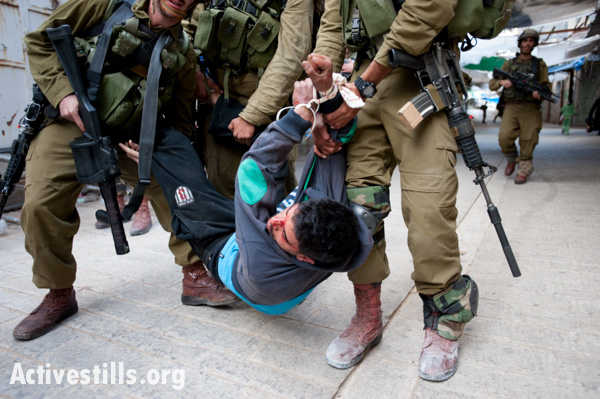Instead of reviling Palestinian accession to the International Criminal Court as an effort to delegitimize and isolate it, Israel would be better off focusing inward.
By Emily Schaeffer Omer-Man
One of the more ironic aspects of Israeli opposition to Palestinian accession to the Rome Statute of the International Criminal Court (ICC) is its deep involvement in the court’s establishment. Not long before Israel joined the ranks of the U.S. and Sudan in “unsigning” the statute, it was one of its chief proponents and architects. In signing the treaty in 2000, Israel professed its support for the court, despite its concerns about certain “politically motivated” provisions – namely, the inclusion of settlements as a war crime (note: they were at the time, and remain, a clear violation of the Fourth Geneva Convention and a grave breach of Additional Protocol I).
Yet, since the Palestinian Authority’s first attempt to invoke ICC jurisdiction in 2009 following Cast Lead, Israel has treated any Palestinian move toward joining the same legal body it helped erect as anathema – final proof that there is no partner for peace. In addition, the move has provided Israel another opportunity to deflect blame from its own actions by accusing the Palestinians of being the real war criminals.

What is beyond ironic here, and in fact cause for concern, is that the Palestinian bid to the ICC would pose no threat to Israel if the latter were to meet the complementarity requirement under the court’s statute. According to the Rome Statute, state actors over which the court has jurisdiction by virtue of the said state being a party to the treaty, or the complaint having been launched by a state party, may only be prosecuted if it can be shown that the same state is “unwilling or unable” to carry out a genuine investigation and prosecution of the alleged war crime.
Israeli human rights NGOs have long pointed out numerous structural and substantive failures in the Israeli military justice system such that it falls short of nearly all of the requirements enshrined in international law: the professional, independent, impartial, prompt, public and effective investigation and prosecution of suspected war crimes committed against Palestinians and their property. NGOs such as Yesh Din and B’Tselem have repeatedly documented systematic failings entrenched in the apparatus, starting with significant barriers to accessing complaint bodies and including decisions not to investigate a large percentage of complaints, the failure to conduct basic investigative activities (including visiting the crime scene), and unreasonable delays in investigative activities and prosecutorial review, which regularly thwart prosecution due to insufficient evidence or statutes of limitation.
Under the Israeli military justice system the Military Advocate General both counsels the military on the law during operations and decides whether to investigate and indict those accused of violating it after the fact. Moreover, relevant Israeli criminal law does not define offenses that constitute war crimes as such, and thus they are not prosecuted and penalized with the appropriate gravity. For instance, after Cast Lead two soldiers who used an 11-year-old Palestinian boy as a human shield (a war crime) were demoted and given three-month suspended sentences (the MAG came under fire merely for indicting them).
In 2011 Israel appointed an internal commission of inquiry into the effectiveness of its military justice system. The resulting Turkel Commission report harshly criticized the system and made 18 concrete recommendations for reform. Yet nearly two years after its release the report’s recommendations have yet to be implemented. Furthermore, even if they were to be implemented, the Turkel recommendations are insufficient, as they merely provide structural improvements. However no guideline or policy or law can replace sheer willingness.
Until there is a true desire on the part of the Israeli government to uncover and criminalize the truths about offenses committed by the country’s sons and daughters when in uniform, be they in combat in Gaza, stationed at a checkpoint in the West Bank, or signing a new land theft order, Israeli investigations will continue to go through the motions without yielding results. And Israeli soldiers and officials, from the lowest to the highest ranks, will continue to act with impunity.

Instead of reviling Palestinian accession to the ICC as an effort to delegitimize and isolate it, Israel would be better off focusing inward. The only threat to Israeli soldiers and officials abroad is the lack of proper investigations at home. Indeed, the same commitment Israel declared in its signing of the Rome Statute — to “the rule of law and the prevention of impunity” — is its best chance at avoiding ICC jurisdiction.
As for the settlements, Israel might want to rethink any upcoming construction plans.
Emily Schaeffer Omer-Man is a human rights lawyer specializing in international humanitarian law at the Michael Sfard Law Office in Tel Aviv. She also serves as Legal Director of Yesh Din’s Security Forces Accountability Project and has challenged numerous IDF policies in Israeli courts.
Read a Hebrew version of this article on +972’s Hebrew-language sister site, Local Call, here.
Related:
Why Israelis should welcome Palestine’s ICC bid
The world’s obligation to end the occupation

